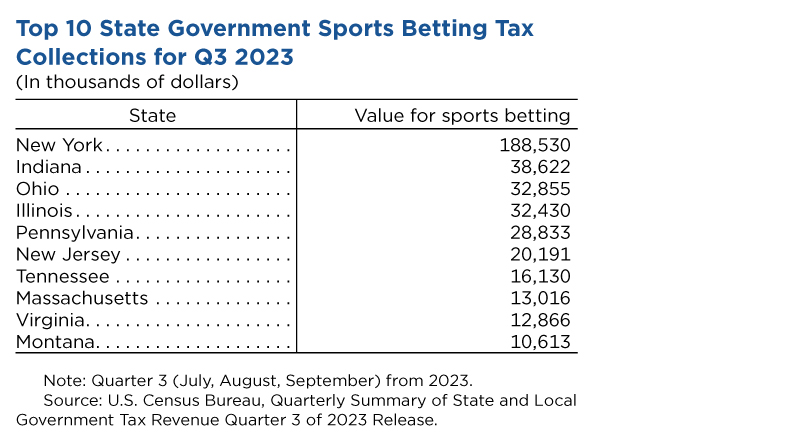Quarterly Survey of State and Local Tax Revenue Shows Which States Collected the Most Revenue from Legalized Sports Betting
Legalized sports betting is a growing business in many U.S. states and the tax revenue it generates funds various state resources from roads and highways to public education, law enforcement and gambling addiction programs.
The Super Bowl just took place on February 11 but there are many more big sporting events on the roster this year from March Madness to the World Series. So just how much tax revenue and gross receipts come from sports betting in states where it’s legal?
The U.S. Census Bureau’s Quarterly Survey of State and Local Tax Revenue (QTAX) recently added sports betting (including pari-mutuels) to the extensive list of state and local tax revenue sources it already tracks.
Sports betting became possible in May 2018 when the Supreme Court struck down the Amateur Sports Protection Act. Since then, 38 states as well as the District of Columbia and Puerto Rico have legalized some form of sports betting though not all have implemented it.
In the third quarter of 2023, the most recent version of the QTAX, sports betting generated national state level sales tax and gross receipts of $505.96 million, up 20.5% from the same quarter a year before, but down from $571.48 million the second quarter of 2023.
New York was the state with the largest share of the nation’s tax revenue in the second quarter of 2023: $188.53 million or more than 37% of total tax revenue and gross receipts from sports betting in the United States. Indiana ($38.6 million) and Ohio ($32.9 million) followed.
Sports betting became possible in May 2018 when the Supreme Court struck down the Amateur Sports Protection Act. Since then, 38 states as well as the District of Columbia and Puerto Rico have legalized some form of sports betting though not all have implemented it. Vermont was the most recent state to legalize it beginning January 11 of this year.
About QTAX
This survey provides tax data on property taxes, license taxes, income taxes, and sales and gross receipts taxes. The QTAX collects state and local tax revenue data on these categories:
- Property Taxes
- Sales and Gross Receipts Taxes for:
- Motor Fuels
- Alcoholic Beverages
- Public Utilities
- Insurance Premiums
- Tobacco Products
- Amusements
- Sports betting (including pari-mutuels)
- Other
- License Taxes for:
- Alcoholic Beverages.
- Public Utilities.
- Motor Vehicles.
- Motor Vehicle Operators.
- Hunting and Fishing.
- Corporations In General.
- Amusements.
- Occupation and Businesses.
- Other.
- Income Taxes (Individual and Corporation Net Income).
- Other Taxes (Including Death/gift, severance, documentary/stock transfer).
Related Statistics
-
Stats for StoriesSuper Bowl LVIII: February 11, 2024The big game involves two top-50 U.S. metro areas by estimated population: #13 San Francisco (4,579,599) vs. #31 Kansas City (2,209,494), playing in Las Vegas.
-
Stats for Stories93rd Major League Baseball (MLB) All-Star Game: July 11, 2023The 2023 All-Star Game is the 93rd since 1933. Four years (1959-1962) had two games. Two years (1945 and 2020) had none. Seattle hosted 1979, 2001, and 2023.
-
Stats for StoriesNCAA Women’s and Men’s Basketball Final Fours: March 31 - April 3To observe March Madness in 2023, we offer stats about the hometowns of the Final Four women’s and men’s teams, plus the two host cities.
Subscribe
Our email newsletter is sent out on the day we publish a story. Get an alert directly in your inbox to read, share and blog about our newest stories.
Contact our Public Information Office for media inquiries or interviews.
-
Business and EconomyPandemic’s Impact on Indoor and Outdoor Recreation RevenueJanuary 17, 2024Estimated revenue of some indoor activity industries were still recovering while estimated revenue of some outdoor recreation industries grew 2019-2021.
-
Population2024 Super Bowl: Fun Facts About the Players and PlacesFebruary 08, 2024Five-time Super Bowl champ San Francisco 49ers face three-time champ Kansas City Chiefs. Both have lost two Super Bowls.
-
PopulationWho Manages Vital Natural Resources in Our Daily Lives?August 24, 2023Special district governments often manage the natural resources we rely on, from running water to electricity.
-
PopulationStates With High Median Ages May Not be as Uniformly Old as You ThinkJune 26, 2025A state’s median age does not tell the whole story. Florida has the fifth highest median age yet also has counties younger than the national median.
-
PopulationAn Aging Nation: U.S. Median Age Surpassed 39 in 2024June 26, 2025Median age rose in 85% of the nation’s 387 metro areas from 2020 to 2024 and was higher than the national median of 39.1 in almost half of metro areas.
-
EmploymentTrends in Self-Employment Among Hispanic WorkersJune 18, 2025Census Bureau data show that among younger and foreign-born workers, Hispanic workers are self-employed at higher rates than non-Hispanic workers.
-
HousingProperty Insurance Costs Can be High in Every U.S. RegionJune 10, 2025American Community Survey data show the price of property insurance varied widely across the nation, but every region had pockets of high cost.





